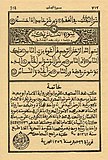Warsh recitation
This article has multiple issues. Please help improve it or discuss these issues on the talk page. (Learn how and when to remove these messages)
|
| Part of a series on |
| Islam |
|---|
 |
The Warsh recitation or Warsh ʽan Naafiʽ' (Template:Lang-ar) is a Qira'at of Holy Quran in Islam.[1]
Presentation
This recitation of the Quran, known in Arabic as the Qira'at, is conducted according to the rules of Tajwid,[2] in accordance with the Ahruf.[3]
This method is attributed to Imam Warsh who himself obtained it from his teacher Nafiʽ al-Madani who was one of The Seven Readers who transmitted The Ten Readings.[4]
The recitation of Warsh 'an Naafi' is one of the two major traditions of Quranic recitation.[5]
History
This recitation relates to Imam Warsh (110-197 AH), whose real name is Uthman Ibn Sa‘id al-Qutbi, who was born in Egypt.[6]
His nickname Warsh (Template:Lang-ar), a milk substance, comes from his teacher Nafiʽ al-Madani due to his fair complexion.[7]
He studied his recitation according to Naafiʽ in Medina.[8]
After completing his studies, he returned to Egypt where he became the senior Qāriʾ of the Quran.[9]
In the tenth century, the Muslim scholar Abu Bakr Ibn Mujāhid canonized the seven readings of the Quran, including Warsh ʽan Naafiʽ.[10]
Although having emerged in Egypt, the recitation of Warsh ʽan Naafiʽ has become widespread in North Africa.[11]
In medieval times, it was the main Quranic recitation in Al-Andalus.[12]
The transmission of Warsh ʽan Naafiʽ represents the reciting tradition of Medina.[13]
It is, alongside the Hafs recitation tradition which represents the recitation tradition of Kufa, one of the two main oral transmissions of the Quran in the Muslim world.[14]
Gallery
Warsh recitation with Maghrebi script
-
Throne Verse in Thaalibia Mus'haf.
-
Short Surates in Thaalibia Mus'haf.
-
End of Thaalibia Mus'haf.
-
Dua in Thaalibia Mus'haf.
Warsh recitation with Kufic script
-
Presentation of Algeria Mus'haf.
-
Al-Fatiha in Algeria Mus'haf.
-
The Throne Verse in Algeria Mus'haf.
-
Short Surates in Algeria Mus'haf.
-
End of Algeria Mus'haf.
See also
References
- ^ السمنودي, أبي عبد الله محمد بن حسن/المنير (January 1, 2011). "إتحاف حملة القرآن برواية سيدي ورش عن الإمام نافع من طريق الشاطبية". Dar Al Kotob Al Ilmiyah دار الكتب العلمية – via Google Books.
- ^ "العلوم التجويدية في شرح المقدمة الجزرية soft cover" – via books.google.dz.
- ^ "الزيادة والإحسان في علوم القرآن 1-3 ج2" – via books.google.dz.
- ^ علي, ابن سوار البغدادي/أبو طاهر أحمد بن (January 1, 2010). "المستنير في القراءات العشر". Dar Al Kotob Al Ilmiyah دار الكتب العلمية – via Google Books.
- ^ الجزري, شمس الدين أبي الخير محمد بن محمد/ابن (January 1, 2016). "النشر في القراءات العشر". Dar Al Kotob Al Ilmiyah دار الكتب العلمية – via Google Books.
- ^ القلانسي, أبي العز محمد بن بندار/الواسطي (January 1, 2007). "الكفاية الكبرى في القراءات العشر". Dar Al Kotob Al Ilmiyah دار الكتب العلمية – via Google Books.
- ^ النويري, محمد بن محمد بن محمد بن علي. "شرح طيبة النشر في القراءات العشر - الجزء الأول". ktab INC. – via Google Books.
- ^ الحسن, أبو الكرم الشهرزوري/المبارك بن (January 1, 2008). "المصباح الزاهر في القراءات العشر البواهر 1-2 ج1". Dar Al Kotob Al Ilmiyah دار الكتب العلمية – via Google Books.
- ^ "طيبة النشر في القراءات العشر". IslamKotob – via Google Books.
- ^ "شرح طيبة النشر في القراءات العشر". IslamKotob – via Google Books.
- ^ الواسطي, عبد الله بن عبد المؤمن/ابن الوجيه (January 1, 1998). "الكنز في القراءات العشر". Dar Al Kotob Al Ilmiyah دار الكتب العلمية – via Google Books.
- ^ "الاختلاف الصرفي في القراءات العشر وأثره في اتساع المعاني" – via books.google.dz.
- ^ مهران, أبي بكر أحمد بن الحسين/ابن (January 1, 2018). "الغاية في القراءات العشر". Dar Al Kotob Al Ilmiyah دار الكتب العلمية – via Google Books.
- ^ "المبسوط في القراءات العشر" – via books.google.dz.

